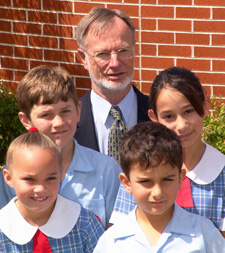 Sydney Diocese's peak education body says the Federal Government's plan to fund school chaplains is a backward step that could compromise church involvement in schools.
Sydney Diocese's peak education body says the Federal Government's plan to fund school chaplains is a backward step that could compromise church involvement in schools.
Newly appointed director of the Anglican Education Commission (AEC), Dr Bryan Cowling, says the move to have chaplains has come from other states where Special Religious Education (SRE) is not permitted.
"In New South Wales the introduction of chaplains in government schools under the conditions proposed by the Prime Minister would be a backward step," Dr Cowling says.
"We are not attracted to this idea at all."
The Prime Minister John Howard has announced the Federal Government will give up to $20,000 a year to government and non-government schools that want to provide chaplaincy services.
The program is voluntary and schools and parents will decide if the chaplain will have a religious affiliation.
Chaplains will be expected to provide pastoral care, religious and personal advice and support to all students and staff.
In NSW, unlike most other states, the churches have a legislative right to deliver SRE in government primary and high schools.
"This provides us with an opportunity to teach the Bible with parents' permission to thousands of children and young people each week," Dr Cowling says.
"In any school this might involve up to a dozen trained SRE teachers interacting with students. We would hate to have this compromised by the employment of one chaplain acceptable to the government."
Dr Cowling adds that the issues cited by the Prime Minister as the basis for the scheme "have more to do with student welfare' and would be better met by investing more in better training of teachers and student welfare personnel to respond to crises when they arise.
Grant Maple, current director of the AEC and chair of the Inter-Church Commission on Religious Education in Schools says the primary concern is maintaining the right of access of local churches to teach children the Christian faith.
"We see this [proposal] could blur the lines or would actively work against it," Dr Maple says.
He says state schools have strict guidelines for SRE teachers but warned there may be "severe risks' of stirring up tensions between faith groups under the plan.
"The money may be nice but there are potential difficulties that need to be addressed at the outset," Dr Maple says.
AEC to be a "catalyst' for transforming education in schools, churches
Meanwhile, Sydney Diocese is stepping up its Christian education strategy.
Dr Cowling says the newly expanded Anglican Education Commission (AEC) is set to be a catalyst for transforming education over the next ten years " and not just in Anglican schools, but in churches, organisations like Anglicare and the public education system.
Synod last week endorsed a motion to re-establish the AEC as an independent body, enabling it to take on a "broader responsibility' for advocacy, teacher recruitment and teacher education.
Dr Cowling, founding principal of Thomas Hassall Anglican College in West Hoxton, will take over from Dr Maple next year upon Dr Maple's retirement.
The starting-point for the AEC will be in helping the Anglican school system to be more effective through teacher training.
"We need to recruit more Christian teachers, and ensure that Christian Studies teachers can actually get some formal training," Dr Cowling says.
"All of our teachers need to be engaged in continuous improvement."
. "In some of our schools we can reach more kids in a week than some local churches will see in ten years," he says.
"There's 1100 kids at my school, and we need to make sure that what they're being taught is of the highest quality."
But the AEC's role in fostering educators' professional development won't stop there.
"All teachers are required to undertake a certain amount of professional development training each year, and as we get established, our teacher education programs will be offered to teachers in state schools, Catholic schools, wherever they're needed," Dr Cowling says.
Dr Cowling hopes that the AEC will be able to offer course to Christian teachers in state schools that will help them "teach christianly' in their own contexts.
But education is "much bigger' than just the schools, Dr. Cowling says.
"As we thought about the Mission of the diocese, we realised that churches are involved in education every week. We need a holistic approach: we want to help pastors, laypeople and people working in Anglican organisations become better preachers and better teachers," he says.
"The big picture is that as we make some headway there will be a flow-on effect to the entire Christian community."
The commission will formalise and strengthen its role in advocacy, engaging with the government on a range of issues for Anglican schools, parents and students, like school Scripture classes or broader education policy issues.
"We'll be in there with a credible voice," he says.
Story by Andrew Robinson with additional reporting by Madeleine Collins
Photos: Scott Webster/Matt Black Productions






















